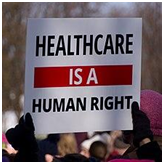Right to Health
Context: The Rajasthan government has introduced the Right to Health Bill in the legislative assembly. The legislation, if passed, will provide mandatory free and affordable medical services in hospitals, clinics and laboratories — both public and privately owned.
What does Bill say?
- The government tabled the Right to Healthcare Bill, 2022 in the Rajasthan State Assembly in September 2022.
- The Bill provides rights to patients and healthcare providers, places the obligation on the government to protect these legal rights and mandates the setting up of grievance redressal mechanisms.
- Rajasthan residents will be entitled to free check-ups, drugs, diagnostics, emergency transport and care at all public health institutes, along with affordable surgeries.
- The Bill frames medical services as a public service rather than a vehicle for making money. If enacted, the Act will have a recurring annual expenditure of ₹14.5 crore.
- Bill lays down 20 rights a State resident will be entitled to — including the right to informed consent, to seek information (in the form of medical records and documents) regarding diagnosis and treatment, and to receive treatment without discrimination based on caste, class, age, gender, etc.
- It also shifts the burden of responsibility in providing adequate medical services to the government. The government is “obligated” to provide funds, set up institutions and constitute grievance redressal systems.
- Clause 4 mandates that the government develop a Human Resource Policy for health ensuring equitable distribution of doctors, nurses and healthcare workers at all levels of the system across regions.
Constitution on right to health
- The Indian Constitution does not explicitly talk about a right to health. A “right to health”, in theory, is derived from the right to life and liberty as guaranteed under Article 21 of the Constitution.
- Courts have highlighted the State’s obligation to protect and promote the health of citizens, pointing to Constitutional provisions such as Article 38 (promoting the welfare of people) and Article 47 (which directs the government to meet the nutrition and health requirements of the population).
Criticism
- The uncompromising resistance to the Bill has come from private healthcare providers, owing to the ambiguity around who will pay for the mandatory free-of-cost emergency treatment.
- A pamphlet in circulation across the States, published by a “Joint Action Committee”, lists the Bill’s other alleged shortcomings: that it abdicates the State’s responsibility in providing health protection and puts a larger patient load on the private sector.
- Further, doctors argue the Bill is both futile and an exercise in over-regulation. Clinics and hospitals are required to abide by State regulations and norms.
- Moreover, there’s no mention of a designated time frame within which the rules must be framed and the Bill loosely mentions the term “guarantee” — which makes the actual execution of an Act ambiguous.
| Practice Question
1. Right to health and Education are the basic needs the government should provide to every citizen. In this context what are the steps taken by the government to ensure fulfilment of these rights? |




